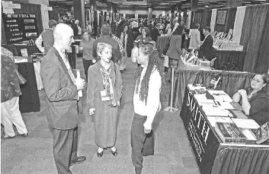The Concerns of the Profession
As noted by Kendall (2002), CSWE's early activities included the formulation and regular review of accrediting standards, recruitment of social work students at the graduate level in response to a decline in enrollment, a study of the social work curriculum (see Boehm, 1959), compilation and publication of statistics on social work education programs, and work on federal legislation that pertained to social welfare and social work education.
.jpg?lang=en-US) CSWE's first Annual Program Meeting was held in St. Louis in January 1953 with 400 attendees, and it published the first issue of the Journal of Education for Social Work (now known as the Journal of Social Work Education) in 1965 with Margaret Williamson as editor-in-chief.
CSWE's first Annual Program Meeting was held in St. Louis in January 1953 with 400 attendees, and it published the first issue of the Journal of Education for Social Work (now known as the Journal of Social Work Education) in 1965 with Margaret Williamson as editor-in-chief.
Ensuring that the multifaceted social work profession was fully reflected in CSWE's work also was a priority. As noted by Trolander (1997, p. 120), CSWE wasthe first among national accrediting bodies to have an affirmative action standard. An affirmative action accreditation standard for women was instituted some years later (CSWE, 1977).
Carl Anderson Scott joined the CSWE staff in September 1968 to assist schools of social work in recruiting students and faculty members from .jpg?lang=en-US)
diverse populations as well as attend to minority representation on CSWE governance entities. He later was instrumental in the development of CSWE's Minority Fellowship Program, which seeks to increase the number of scholars, educators, and leaders dedicated to improving services to underserved individuals.
CSWE issued task force reports in 1973 concerning social work education issues for African Americans, Asian Americans, Chicanos, Native Americans, and Puerto Ricans.
A task force on women was created in 1972 that evolved into a commission focused on developing resources on women's issues within social work education. The first meeting of CSWE's Gay and Lesbian Task Force was held in December 1980 and focused on undergraduate, graduate, and continuing education content on gay and lesbian issues as well as gay and lesbian field settings (CSWE, 1981).
The task force developed into the Council on Sexual Orientation and Gender Expression. CSWE later published an annotated bibliography on lesbian, gay, bisexual, and transgender issues in social work(Martin Hunter, 2001). In 2006 the CSWE board of directors approved the establishment of the Center for Diversity and Social & Economic Justice that promotes initiatives to advance social justice and individual and community well-being. CSWE subsequently teamed up with Lambda Legal in 2008-2009 to study social work content related to lesbian, gay, bisexual, and transgender individuals, seeking to determine the resources needed to better serve this population—particularly youth in out-of-home care (Martin et al., 2009).
 In addition, reflecting international perspectives in social work in U.S. programs and promoting connections with colleagues in other countries have been important to CSWE.
In addition, reflecting international perspectives in social work in U.S. programs and promoting connections with colleagues in other countries have been important to CSWE.
It spearheaded projects in schools of social work in Africa and India that fostered student exchange, consulted with entities such as the United Nations and the Pan-American Health Organization, organized the first seminar for schools of social work in Central America in 1962, and participated in conferences of the International Association of Schools of Social Work (Kendall, 2002).
CSWE founded the Katherine A. Kendall Institute for International Social Work Education(Opens in a new window) in 2004 to advance its work in fostering a global perspective in social work education and promoting interactions with international scholars and practitioners. CSWE's International Social Work Degree Recognition and Evaluation Service continues to evaluate social work credentials from outside the United States.
CSWE activities also have focused on specific fields within social work. In 1960 CSWE consultant Eileen Younghusband produced a study on corrections. Mental health was an early locus for CSWE efforts such as the Minority Fellowship Program and projects funded by the National Institute of Mental Health that provided consultation services and produced curriculum materials on chronic mental illness, psychopharmacology, and prevention. It remains in the forefront via programs such as the Recovery to Practice initiative.
The desire to improve the preparation of those intending to work with older adults resulted in the establishment in 2004 of CSWE's National Center for Gerontological Social Work Education, funded by the John A. Hartford Foundation. In 2010 CSWE issued Advanced Social Work Practice in Military Social Work(Opens in a new window), an effort to better equip those planning to work with veterans, service members, and their families.
About the photos: Margaret Williamson, top left; Carl Anderson Scott, middle right; the Exhibit Hall at the 2006 Annual Program Meeting, Chicago, bottom left.
